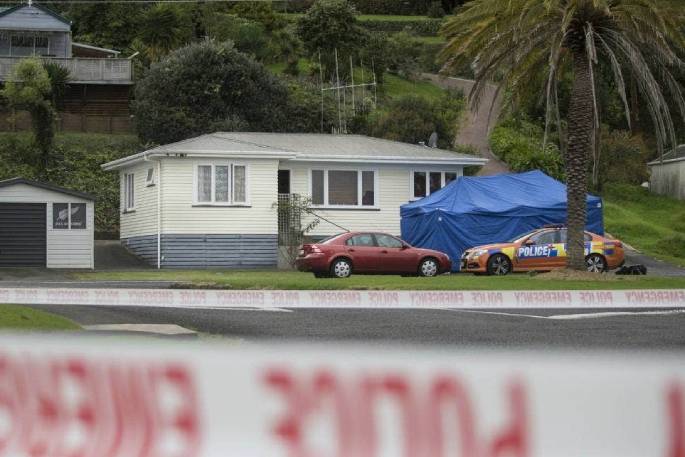An expert psychiatrist who delivered 'stinging criticism” of an industry colleague's care of a mentally unwell man later shot by police has been given a grilling in court.
Vaughan Te Moananui, 33, was killed by police following a brief stand-off in a suburban street in Thames, about lunchtime on May 4, 2015, after he refused to put down a rifle he was pointing at them.
The inquest into his death was opened in October 2019 and, following those earlier hearings, Coroner Michael Robb issued an interim ruling finding Te Moananui's psychiatric care was not adequate.
However, more hearing time was required because the former Waikato District Health Board psychiatrist – whose name has been suppressed – has challenged Robb's criticisms of him.
As part of the earlier inquest process, the coroner sought an independent opinion. The provider of that opinion, experienced forensic psychiatrist Dr David Chaplow, said the doctor misunderstood his role.
The standard of care he had provided was poor and substandard, Chaplow found. There was no excuse for not reading the progress notes.
He said there was no identification by the doctor of the risks of Te Moananui reducing his medication, changing address, abusing alcohol or the need to engage with whānau.
The psychiatrist was "non-assertive" in his practice and 'inadequate, possibly incompetent” in his approach to assessing and formulating a management programme and involving others, Chaplow found.
In the Hamilton District Court on Tuesday – the second day of the resumed inquest into Te Moananui's death – Chaplow was quizzed extensively by Matthew McClelland, QC, who is acting for the psychiatrist.
McClelland said Chaplow's review was flawed, in that it focussed on his client's role in the death of Te Moananui, and ignored others at the DHB whose decisions – or possible lack of action – may have contributed to Te Moananui's deterioration.
Chief among these was a mental health nurse who was charged with dealing with the unwell man.
'You were looking at [the psychiatrist] in a vacuum, weren't you,” McClelland said.
McClelland also said Chaplow's opinion may have been tainted by the coroner's initial judgement of the case.
'You knew what his thoughts were. You got his draft findings. They were not very favourable to [the psychiatrist].”
McClelland also took issue with the 'superlatives” contained in Chaplow's report, including expressions such as 'cavalier in the extreme” and 'it amazes me” when referring to Te Moananui's treatment from the psychiatrist.
Chaplow said it was unusual for him to use such strong language in one of his reviews, 'but I don't resile from that”.
McClelland said Chaplow's review had contained 'stinging criticism” of his client, including a suggestion it appeared the psychiatrist had never managed 'a complex case” like Te Moananui.
'You did not know what [the psychiatrist's] background was,” the lawyer said.
Chaplow conceded: 'It would have been helpful for me to know that. I accept the criticism.”
The coroner also queried Chaplow if he would expect a psychiatrist to read the case notes of a patient prior to meeting with him or her.
'That would be a reasonable expectation,” Chaplow said.
Robb also asked Chaplow about Te Moananui's decision to decrease the dosage of his anti-psychotic medication Clozapine.
Chaplow said while the patient would have temporarily felt better, due to lessened side effects, he surmised that the absence of sufficient quantities of the drug in his system, combined with stresses he experienced in his daily life and the introduction of other substances would likely have resulted in either depression or a psychotic episode.
The inquest earlier heard that Te Moananui had a long history of poor mental health, including schizophrenia, and had been admitted to psychiatric facilities multiple times. He had also been prosecuted for violent offending when unwell.
Risk factors identified on his most recent discharge from the Henry Rongomau Bennett Centre in Hamilton, about a year before his death, included isolation, alcohol consumption and not being appropriately medicated.
Te Moananui was meant to be checked up on within seven days of his release – but it was about five weeks before this took place.
It was recommended he start a drug and alcohol programme and be closely monitored, but this never happened.
Instead, he moved out of his parents' home, began living alone, started drinking alcohol and massively reduced the dose of the anti-psychotic he was taking because it made him feel drowsy.
In spite of these danger signs, the psychiatrist – who was unaware Te Moananui had begun drinking again – had assessed him as 'doing well”.
At the conclusion of the hearing, Coroner Robb said he would reserve his updated judgement, pending any further submissions from McClelland or the health board's legal counsel Paul White.
Whether the psychiatrist at the centre of the inquest's inquiries would be granted permanent name suppression would be decided at that point, he said.



0 comments
Leave a Comment
You must be logged in to make a comment.